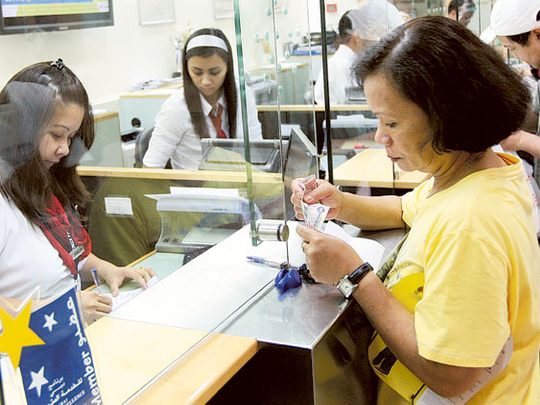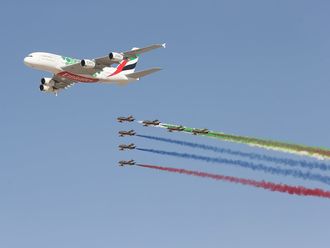
Every month, Cynthia Pablo sets aside 20 per cent of her salary for remittance back home. Remittances are a lifeline for millions of families in many countries, particularly in Asia.
When converted into pesos, the amount Cynthia sends every month is sufficient enough to pay for the school tuition of her sister’s two young children in the Philippines and meet immediate household needs.
However, every time Cynthia sends money home, she chips away 2.5 per cent of the monthly dole-out (Dh25 dirhams) which she pays to an agent in the UAE to facilitate the fund transfer.
The cost of the single transaction is roughly equivalent to a day’s wage of a Filipino worker based in Cynthia’s hometown, Iloilo, 460 kilometres southeast of Manila.
On top of that, her sister has to travel one hour to and from the town centre and spend extra money for transport fare just to collect the allowance.
“There’s no money transfer agent next door and the nearest one is in the commercial centre. Just getting there takes about 30 minutes, one way” Cynthia, a Filipino expatriate working for a company in Dubai said.
A huge proportion of expatriates in the UAE regularly send money to their home countries, in the hope of improving the lives of their dependent families. When combined, remittances of Asians around the world reached $260 billion in 2012.
According to the International Fund for Agricultural Development (Ifad) and the World Bank, the volume of money being sent to Asian families is equivalent to more than 10 per cent of gross domestic product in Afghanistan, Bangladesh, the Philippines and Nepal, and more than 50 per cent in Tajikistan.
However, the cost of money transfers and limited financial services outside of urban areas are eating away the benefits of those remittances.
In its report released in May, “Sending money home to Asia,” Ifad and World Bank said expatriates spend an average of 8.35 per cent to send money home to Asia. This “means that less money is going to reducing poverty and boosting prosperity for their families,” the report said.
If the cost of fund transfer is reduced to 5 per cent, expats’ dependent families stand to pocket $8.7 billion more every year, said Janamitra Devan, vice president for financial and private sector development at World Bank Group.
The UAE is considered by the World Bank as one of the cheapest locations to send money from. A closer study of transfer fees charged in the UAE showed that remittance costs can get expensive for those sending smaller amounts.
A construction worker sending Dh250 to Pakistan, for example, will end up spending 10 per cent of the amount, to pay the money transfer agent. Western Union charges Dh25 to transfer up to Dh3,650 to the Philippines and Pakistan and Dh15 to transfer up to Dh10,000 to India.
“Even though the average costs of sending money to Asian markets are below the global average, remittances to rural areas are still much more expensive,” Ifad and World Bank said.
Besides, two-thirds of remittance payment outlets in Asia are located in urban areas while many remittance beneficiaries are based in rural towns. This dysfunctional geographic mismatch results in added time and expense for rural recipients as they travel long distances just to pick up the money, the report said.
Considering that they have no access to savings accounts or any financial instruments, remittance beneficiaries “have few investment options beyond daily subsistence needs such as food, clothing and shelter.”
Kevin Cleaver, Ifad associate president, also calculated that if rural families are given more financial options to use the money they receive, they could save, invest or put back into communities some $30 billion. “If this happens, migration for future generations could become a matter of choice rather than a necessity,” Cleaver said.
To reduce money transfer costs, the report recommended that governments and private sector need to come up with new regulations that can foster competition among money transfer operators and “develop a stronger payments system infrastructure.”
Asked to comment on the Ifad and World Bank report, Sobia Rahman, Western Union regional vice president for the Gulf, Pakistan and Afghanistan pointed out that remittance costs from the Gulf to Asia are among the lowest in the world.
“Western Union prices are competitive in this market. [Our company] reaches over 515,000 agent locations in 200 countries and territories. In India alone, we have over 113,000 agent locations. We always keep in mind remote areas and have built our infrastructure to convenience all our customers,” she said.












